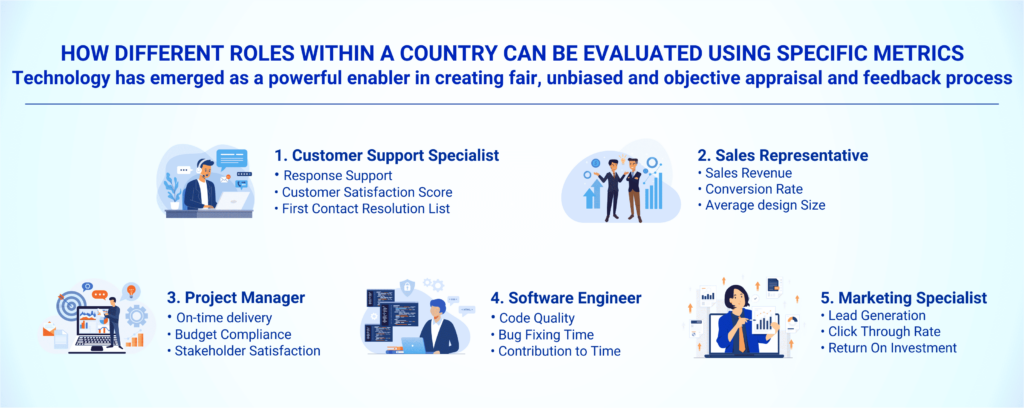Welcome back to this series where in the first edition we discussed about fair appraisals and how to build a strong work culture based on this system. In this second edition we are going to talk about technology as an enabler in building fair appraisal systems. We will explore how organizations can leverage technology to transform their appraisal processes, creating a culture of transparency, inclusivity, and continuous growth.
Here’s the Short Scoop. In the contemporary business landscape, the integration of technology into fair appraisal systems is not just a strategic choice but a necessity for organizations aiming to thrive in a competitive environment.
Why? Because leveraging technology in appraisal processes ensures objectivity, transparency, and accuracy, mitigating the potential for bias and subjective judgments. Because automated appraisal systems can analyze a myriad of data points, including performance metrics, project outcomes, and individual contributions, providing a comprehensive and nuanced evaluation of employee performance. This not only fosters a more equitable work culture but also enhances employee morale and engagement. Technology-driven appraisal systems facilitate real-time feedback, allowing organizations to adapt swiftly to changing dynamics and align individual goals with overarching business objectives. Embracing technology in appraisal processes is pivotal for organizations aspiring to cultivate a dynamic and fair performance evaluation framework that not only recognizes individual achievements but also propels the collective success of the workforce and the organization as a whole.
In today’s fast-paced work environment, performance appraisals and feedback play a vital role in shaping an employee’s career trajectory and company growth. However, traditional appraisal processes have long been plagued by subjectivity and bias, leading to inequitable outcomes and demotivation among employees. Thankfully, the emergence of technology has opened doors to a new era of fair, unbiased, and objective appraisal and feedback systems.
1. Performance Management Software: Fair Assessments
Performance management software, such as Workday, SuccessFactors, or BambooHR, supports objective evaluations by establishing clear metrics, goals, and objectives for each employee. These tools track progress, generate reports, and provide visualizations, including charts and graphs, showcasing key performance indicators and trends. Then there are others such as WorkDay® and SAP SuccessFactors® automate performance management, allowing real-time measurement of employee performance and progress. This data-driven approach enables managers to make informed decisions based on objective information, enhancing overall organizational performance.
Leveraging smart goal-setting tools like actiTime and ally.io further enhances the ability to set and manage SMART goals. Successfactors CPM (Continuous Performance Management) illustrates the benefits and improved engagement achieved through this comprehensive approach.
2. Anonymous Feedback Platforms: Amplifying Voices
Anonymous feedback platforms like TINY pulse, SurveyMonkey, or Culture Amp allow employees to provide feedback without revealing their identities. The anonymity provided by these platforms encourages employees to express their honest opinions and concerns without fear of reprisal. the culture of transparency so created reduces attrition.
3. Machine Learning and AI Algorithms: Forecasting
AI and Machine Learning play a crucial role in fostering fair appraisals by leveraging advanced techniques like Natural Language Processing (NLP). These technologies analyze vast amounts of data, including employee performance reviews and feedback, ensuring a comprehensive and unbiased assessment. NLP enables the system to understand and interpret language nuances, minimizing subjective biases in the appraisal process. AI-driven algorithms can identify patterns and trends, providing a more objective evaluation of individual contributions. This data-driven approach enhances transparency and equity, contributing to a more just and accurate appraisal system.
4. Continuous Feedback and Collaboration Tools: Nurturing Growth in Real-Time
Feedback management gathers inputs from diverse sources, including peers, subordinates, managers, and customers, offering a comprehensive view of employee performance. 360-degree feedback platforms, accessible through tools like Slack, Microsoft Teams, or Asana, facilitate anonymous real-time feedback collection, providing actionable insights and quick responses to sensitive situations. These platforms, fostering continuous communication and collaboration, reduce dependence on infrequent, biased appraisals, creating opportunities for ongoing performance management and improvement. Collaborative tools like Slack and Microsoft Teams further support continuous performance monitoring and measurement.
5. Diversity and Inclusion Analytics Tools
Diversity and inclusion analytics tools like SAP SuccessFactors’ Diversity and Inclusion Analytics use data analytics to pinpoint biases in HR processes, such as appraisals and promotions. By analyzing demographic data and performance metrics, these tools reveal systemic biases, enabling organizations to address and rectify them. This fosters fairness and equal opportunities in the appraisal and feedback processes for all employees and a culture of transparency.
6. Inclusion of Gamification ideas
Gamification refers to adding game mechanics into non-game environment to increase participation, improve engagement and as a whole to make a workplace more fun. It fosters healthy competition in the team and the organization. Several tools are available that help organizations gamify the business activities and allow managers and employee track and visualize their performance real time. This, in turn, aids in objective and unbiased performance appraisal.
It must be noted that not all aspects of an individual’s contribution can be gamified. Sometimes, the correct picture is not presented. Hence, it is essential to ensure that targets or missions being planned for gamification are neither too difficult nor to simple, and contributes only a certain percentage towards overall performance assessment.

Embracing Tech enabled Appraisals Systems for Inclusive Excellence
In the pursuit of fair and objective appraisals, technology stands as a catalyst for positive change, transforming workplaces into environments that celebrate diversity, empower growth, and cultivate a spirit of excellence. Technology-driven solutions ensure that appraisals are based on objective criteria, transparent metrics, and unbiased feedback, fostering a culture of inclusivity, transparency, and meritocracy. By embracing technology, organizations pave the way for a future where employees can thrive, grow, and contribute their best, propelling both individuals and the organization toward success.
We might add that while technology is enabling organizations to create fair, unbiased, and objective evaluation processes free from prejudices a human touch will continue to be necessary to make the performance management process wholesome and equitable for the employees and organization.
Author: Shivam Agarwal





